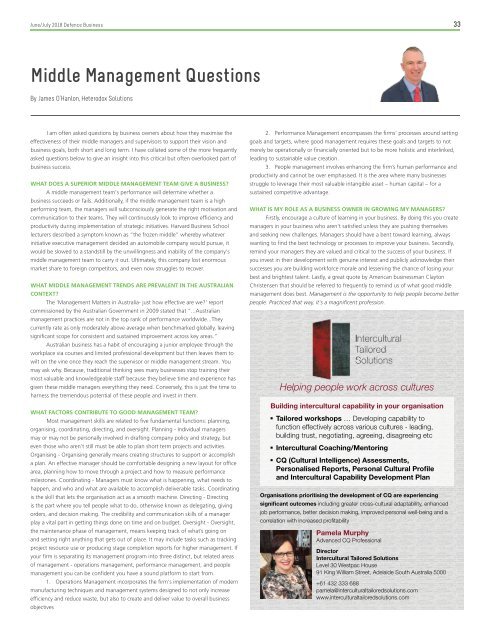Defense Business May-July 2018 Issue
Create successful ePaper yourself
Turn your PDF publications into a flip-book with our unique Google optimized e-Paper software.
June/<strong>July</strong> <strong>2018</strong> Defence <strong>Business</strong><br />
33<br />
Middle Management Questions<br />
By James O'Hanlon, Heterodox Solutions<br />
I am often asked questions by business owners about how they maximise the<br />
effectiveness of their middle managers and supervisors to support their vision and<br />
business goals, both short and long term. I have collated some of the more frequently<br />
asked questions below to give an insight into this critical but often overlooked part of<br />
business success.<br />
WHAT DOES A SUPERIOR MIDDLE MANAGEMENT TEAM GIVE A BUSINESS?<br />
A middle management team's performance will determine whether a<br />
business succeeds or fails. Additionally, if the middle management team is a high<br />
performing team, the managers will subconsciously generate the right motivation and<br />
communication to their teams. They will continuously look to improve efficiency and<br />
productivity during implementation of strategic initiatives. Harvard <strong>Business</strong> School<br />
lecturers described a symptom known as “the frozen middle” whereby whatever<br />
initiative executive management decided an automobile company would pursue, it<br />
would be slowed to a standstill by the unwillingness and inability of the company's<br />
middle management team to carry it out. Ultimately, this company lost enormous<br />
market share to foreign competitors, and even now struggles to recover.<br />
WHAT MIDDLE MANAGEMENT TRENDS ARE PREVALENT IN THE AUSTRALIAN<br />
CONTEXT?<br />
The ‘Management Matters in Australia- just how effective are we?’ report<br />
commissioned by the Australian Government in 2009 stated that “...Australian<br />
management practices are not in the top rank of performance worldwide...They<br />
currently rate as only moderately above average when benchmarked globally, leaving<br />
significant scope for consistent and sustained improvement across key areas.”<br />
Australian business has a habit of encouraging a junior employee through the<br />
workplace via courses and limited professional development but then leaves them to<br />
wilt on the vine once they reach the supervisor or middle management stream. You<br />
may ask why. Because, traditional thinking sees many businesses stop training their<br />
most valuable and knowledgeable staff because they believe time and experience has<br />
given these middle managers everything they need. Conversely, this is just the time to<br />
harness the tremendous potential of these people and invest in them.<br />
WHAT FACTORS CONTRIBUTE TO GOOD MANAGEMENT TEAM?<br />
Most management skills are related to five fundamental functions: planning,<br />
organising, coordinating, directing, and oversight. Planning - Individual managers<br />
may or may not be personally involved in drafting company policy and strategy, but<br />
even those who aren’t still must be able to plan short term projects and activities.<br />
Organising - Organising generally means creating structures to support or accomplish<br />
a plan. An effective manager should be comfortable designing a new layout for office<br />
area, planning how to move through a project and how to measure performance<br />
milestones. Coordinating - Managers must know what is happening, what needs to<br />
happen, and who and what are available to accomplish deliverable tasks. Coordinating<br />
is the skill that lets the organisation act as a smooth machine. Directing - Directing<br />
is the part where you tell people what to do, otherwise known as delegating, giving<br />
orders, and decision making. The credibility and communication skills of a manager<br />
play a vital part in getting things done on time and on budget. Oversight - Oversight,<br />
the maintenance phase of management, means keeping track of what’s going on<br />
and setting right anything that gets out of place. It may include tasks such as tracking<br />
project resource use or producing stage completion reports for higher management. If<br />
your firm is separating its management program into three distinct, but related areas<br />
of management - operations management, performance management, and people<br />
management you can be confident you have a sound platform to start from.<br />
1. Operations Management incorporates the firm's implementation of modern<br />
manufacturing techniques and management systems designed to not only increase<br />
efficiency and reduce waste, but also to create and deliver value to overall business<br />
objectives<br />
2. Performance Management encompasses the firms’ processes around setting<br />
goals and targets, where good management requires these goals and targets to not<br />
merely be operationally or financially oriented but to be more holistic and interlinked,<br />
leading to sustainable value creation.<br />
3. People management involves enhancing the firm’s human performance and<br />
productivity and cannot be over emphasised. It is the area where many businesses<br />
struggle to leverage their most valuable intangible asset – human capital – for a<br />
sustained competitive advantage.<br />
WHAT IS MY ROLE AS A BUSINESS OWNER IN GROWING MY MANAGERS?<br />
Firstly, encourage a culture of learning in your business. By doing this you create<br />
managers in your business who aren’t satisfied unless they are pushing themselves<br />
and seeking new challenges. Managers should have a bent toward learning, always<br />
wanting to find the best technology or processes to improve your business. Secondly,<br />
remind your managers they are valued and critical to the success of your business. If<br />
you invest in their development with genuine interest and publicly acknowledge their<br />
successes you are building workforce morale and lessening the chance of losing your<br />
best and brightest talent. Lastly, a great quote by American businessman Clayton<br />
Christensen that should be referred to frequently to remind us of what good middle<br />
management does best. Management is the opportunity to help people become better<br />
people. Practiced that way, it's a magnificent profession.<br />
Helping people work across cultures<br />
Building intercultural capability in your organisation<br />
• Tailored workshops … Developing capability to<br />
function effectively across various cultures - leading,<br />
building trust, negotiating, agreeing, disagreeing etc<br />
• Intercultural Coaching/Mentoring<br />
• CQ (Cultural Intelligence) Assessments,<br />
Personalised Reports, Personal Cultural Profile<br />
and Intercultural Capability Development Plan<br />
Organisations prioritising the development of CQ are experiencing<br />
significant outcomes including greater cross-cultural adaptability, enhanced<br />
job performance, better decision making, improved personal well-being and a<br />
correlation with increased profi tability<br />
Pamela Murphy<br />
Advanced CQ Professional<br />
Director<br />
Intercultural Tailored Solutions<br />
Level 30 Westpac House<br />
91 King William Street, Adelaide South Australia 5000<br />
+61 432 333 688<br />
pamela@interculturaltailoredsolutions.com<br />
www.interculturaltailoredsolutions.com


















